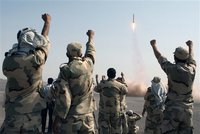Iran wants Russia's S-300 systems through court action
As expected, Iran intends to sue Russia's defense export giant Rosoboronexport to claim four billion dollars from the company for the failure of the supply of S-300 air defense systems. The lawsuit was filed over a year ago, and the Russian side explained its move with sanctions against the Islamic republic. However, defensive arms are not included on the list of prohibited weapons.

Russia has already been accused of the activities to sell arms to recalcitrant regimes in the Middle East. Russia's Foreign Minister Sergey Lavrov said that he was surprised to hear that. According to him, Russia has not conducted such activities. All weapons - helicopters and other types of hardware - were supplied to Bashar Assad, in accordance with the contracts concluded prior to the uprising of the Syrian opposition. If the American authorities have a problem with Syria, then the Russian government had no such problems and does not have them now either.
Damascus can be sure that it has Russia's diplomatic and military support. The situation is different with Iran. The Islamic Republic ordered S-300 anti-aircraft systems from Rosoboronexport, paid money for them, but the complexes have never appeared in the Persian land. Afterwards, Moscow wrote it off to the sanctions established by the West against the Islamic Republic for its alleged development of nuclear weapons.
In fact, S-300 being an element of air defense systems, does not fall into the list of weapons prohibited for exports. S-300 is a defensive weapon. Therefore, it can not be directed against the civilian population. Quite on the contrary, S-300 can be used solely to repel foreign aggression. Nevertheless, Moscow refused to fulfill its obligations to Tehran on the arms contracts.
Russia is the second largest exporter of arms after the U.S. Russia holds 24 percent of the total arms market. The Americans have 30 percent, Germany - nine, France - eight. In total, 80 countries of the world purchase Russian weapons, which indicates Moscow's serious reputation. However, such high-profile scandals as litigations can significantly reduce this proportion. Thus, India has refused to buy Russian fighters, having replaced them with cheaper French Rafale jets. In general, Russia has already lost Central Europe as a sales market. China turns to other countries too. Iran turned its back on Russia as well and went to court even though Rosoboronexport returned the advance payment to Iran.
"Despite the fact that the sanctions were imposed, Russia decided to interpret them positively in its own way, as defensive arms did not fall under those sanctions. Air defense systems are defensive. Russia suspended the shipments a year before the imposition of the sanctions. So we're to blame for Iran. If this case is resolved in Iran's favor, Russia will have to deliver those weapons," Ruslan Pukhov, the director of the Center for Analysis of Strategies and Technologies told Finam news agency.
However, other countries experience the same problems with the reduction of exports, although it happens because of the global financial crisis. The New York Times wrote with reference to the U.S. Congress that the arms sales in 2010 amounted to 40.4 billion dollars, which was 38 percent less than the amount of transactions in 2009 - 65.2 billion dollars.
Nevertheless, the Americans managed to maintain their dominance on the arms market by signing contracts totaling 21.3 billion dollars - a half of the world's transactions. In 2009, the United States was "scraping and saving" - the contracts totaled only 22.6 billion. The Russian contracts in 2010 amounted to $ 7.8 billion or 19.3 percent of the arms market, although in 2009 this figure was higher - 12.8 billion dollars.
So why can't Russia deliver S-300 systems to Iran taking into consideration the fact that the contract was signed back in 2007? Israel and the U.S. put pressure on Moscow: arms supplies do not tally with the Middle East peace process. Benjamin Netanyahu even preferred to turn a blind eye on the friendship of the Russian authorities with the Hamas movement, to avoid the sight of S-300 systems on the borders of the Islamic Republic.
Ilona Raskolnikova
Pravda.Ru
Subscribe to Pravda.Ru Telegram channel, Facebook, RSS!


